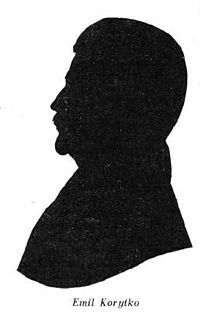Emil Korytko
Emil Antoni Korytko (7 September 1813 – 31 January 1839) was a Polish political activist in the period of the Great Emigration, who was exiled to Ljubljana, Carniola (now Slovenia) and became an important ethnographer, philologist and translator there.
Korytko was born on 7 September 1813[2]: 8 in Zhezhava (now Zelenyi Hai, Zalishchyky Raion[3]) or Lviv in Austrian Galicia (now in the Ternopil Oblast in Ukraine).
In 1834, he was arrested by the Austrian authorities in Lviv on accusations of having participated in underground subversive activities, and in 1836 sent into confinement to Ljubljana, Duchy of Carniola (now in Slovenia), together with Bogusław Horodyński [pl], where they arrived in late January 1837.
He prompted the painter Franz Kurz zum Turn und Goldenstein to paint 70 portraits of people in various folk costumes.
[6] Korytko died at the age of 25 in Ljubljana due to typhus, and was buried at Navje (then St. Christopher's Cemetery) in the Bežigrad District.

